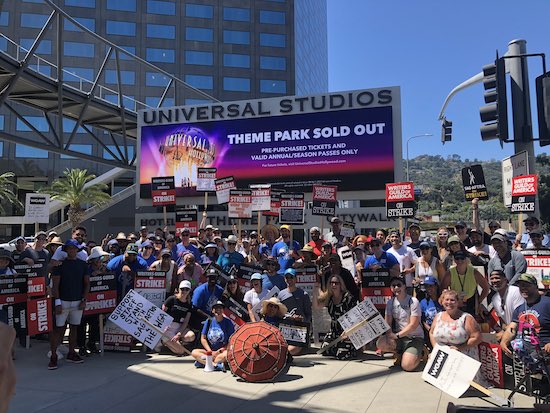The Teams Behind LAW & ORDER: ORGANIZED CRIME and FBI: MOST WANTED Explain Why They’re Supporting the WGA and SAG-AFTRA Strikes: ‘It Is a Fight For Our Lives’
July 21, 2023 by Marisa Roffman

Credit: Marisa Roffman/Give Me My Remote
The Wolf Entertainment shows are no stranger to high-stakes, far-reaching crossovers within the FBI, ONE CHICAGO, and LAW & ORDER franchises. But the creative teams behind the dramas—as well Elliot Wolf, representing the upcoming Prime Video series ON CALL—reunited (and united) outside of the Universal lot for an important reason: To show their support for the ongoing WGA and SAG-AFTRA strikes.
“A few of us writers from the Dick Wolf show got together and decided to do a reunion picket,” Christina Piña, who wrote on LAW & ORDER: ORGANIZED CRIME season 3, as well as serving as a WGA captain at the Universal lot, tells Give Me My Remote. “We all know each other, we’re all friends, we all hang out. So that’s why we’re here today.”
The strikes come at a pivotal time in the television industry, with short-order series becoming the norm. And while fans—rightfully—are frustrated by the number of swift cancellations and minuscule episode counts, it’s also posing a larger problem for the writers who are telling the stories.
“You learn how to be a showrunner,” Piña notes of working on the longer-running network shows, which frequently have 20-plus episodes a season and employ their writers for the duration of the season. (Streaming writers’ rooms frequently wrap before a minute of the season has been shot.) “If you think of medieval times, with the stonemasons, they had a very set program of how you rose up to be a master in those programs…a guild is supposed to have an apprentice aspect to it.”
“You start off as a novice, a staff writer,” she continues. “And then as you go on set, and you’re on your episode, there are prep meetings, tone, costumes, hair, sound, VFX. All kinds of different things, so by the time you get on set for your episode and you’re producing your episode, you actually get to see your hard work manifested into this magic of the episode. It’s beautiful and profound. As you continue this throughout your career, rise within the TV writers’ room hierarchy, you learn how to become a showrunner. [It’s] so that one day, it’s like second nature you know how to produce, how to write. You’re learning how to run your own show.”
“It’s an experience that is dying off,” Jorge Rivera, who serves as the Vice-Chair of the Latinx Writers with Piña, adds. (Rivera also wrote on the Fox drama APB.) “For the longest time, I would say 10-12 years ago, it was peak TV in terms of supporting this kind of apprenticeship and this kind of ecosystem for writers. Enter all the tech companies—Amazon, Netflix, Hulu, Apple—who don’t operate like that at all. [Network TV] was ad-revenue based…And that paid for all of the production. There was an abundance of revenue from those ads, which allowed you to do 22 episodes a year and keep going, and therefore have this big ecosystem to support that apprenticeship.”
“Streamers come in, and their whole thing is completely subscription based,” he continues. “And so budgets have shrunk, orders have shrunk, and therefore that opportunity has shrunk. And instead of being hired as a writers’ room assistant and going up the ladder, these opportunities are shrinking. They’re combining a lot of these lower-level entry jobs— like script coordinator and writers’ PA and writers’ assistant became one job. So all these opportunities are shrinking…shows are getting canceled after one or two seasons. So all of this disruption that is supposed to be innovative has just left the industry in tatters.”
For FBI: MOST WANTED showrunner David Hudgins, this marks his second strike. The first time, in 2007, he was a co-producer on FRIDAY NIGHT LIGHTS. Now, “it’s really interesting to be going through this…where I’m a showrunner and I’ve been doing this 17 years longer,” he explains in the video below. “The issues to me are incredibly important.”
Hudgins acknowledges that some of the bigger issues impacting writers are in the streaming world, “but I’m here for basically the younger writers—the people down below,” he says. “Because we got to give them the chance to make a living…it’s not fair. And I think about what they’re dealing with now versus what I was dealing with back then. And something needs to change. And I think now is the time…we’ve got all these people out here, and nobody has relented.”
While arguments have been made online that people should just accept their one-time initial payment for the script or acting performance—a specious argument considering the revenue syndication continues to bring in for the studios—Hudgins shares how he explained it to his family: “If you write a play, you keep the copyright; if you write a book, you keep the copyright. If you do television or film, it’s a work for hire, you don’t own the copyright and the compensation for that is a residual. And they’re not paying enough. So it’s gonna take something like this to get them to come to the table, I think. And we’re not going to stop until they do come back to the table.”
Though the actors just went on strike, ORGANIZED CRIME’s Rick Gonzalez has been a regular on the picket line for months supporting the writers.
“I’m sure a lot of people have heard the reasons we’re striking is for fair wages,” he explains in the video below. “The idea of protecting ourselves from AI…We’re really trying to make a good adjustment to future writers, to future actors, and protecting them in contracts.”
Both Rivera and Gonzalez reiterate that a large portion of the industry is actually working class—or struggling to even make that.
“Maybe one or two percent are A-listers who make millions of dollars,” Rivera says. “Everyone else is working class and they have families and mortgages or rents. When you look at the end credits of the film or television show, that’s like 200 names; four of them are making millions of dollars, and everyone else is making under 100 grand a year. And that’s what we’re here for. That’s what we’re fighting for: So people can continue doing this work, and live…I really want to dispel the myth that everybody in Hollywood is a billionaire, because it’s not true.”
“The middle-class actors sort of diminished greatly,” Gonzalez adds. “It’s very difficult for people to make a living for themselves. And I think the idea is, as the years have gone on, things have sort of eroded. And I think our unions have said, ‘Enough is enough. We’ve heard the complaints from our people, and I think we have to really fight for that.’ I think if you’re struggling to make ends meet, and yet you have a successful show on television or film, and you’re struggling to provide for your family, that’s wrong. That’s wrong. And we see that in other industries, and I’m not saying anything anyone doesn’t already know…just to reiterate the importance of paying people fairly, and giving people what they deserve.”
“It’s really sad that we’re here, because we have to fight to get what we deserve and what we’re owed,” he continues. “This is also about protecting people that can’t protect themselves in this industry. There’s background actors, there’s other people apart of our union that provide services that we need. And so to take advantage of them would be cruel and rude and wrong. So…how do we protect the middle-class actor? How do we protect every single person?…I have so many friends who are writers, who do wonderful work, work really hard, and struggle. Really, really struggle to make ends meet. And I just don’t see how that’s fair. I just truly don’t see how that’s fair. So, that’s why I’m here.”
With the WGA strike deep into its second month—and the SAG-AFTRA strike closing out its full first week—both guilds can use help from fans.
“One thing is we have the Entertainment Community Fund and various funds you can find on the WGA website or SAG-AFTRA website,” Piña says. “TTIE, Think Tank Inclusion Equity, has a really great list of resources for where you can donate as much as you can. We’re all out here struggling, but we know if we don’t fight now, we’ll all lose our professions in 5, 10, 20 years. It is a fight for our lives.”
“In addition, we could really use your support on social media,” she continues. “Write to your congressman, write to your senator. Talk to your politicians. We are just one piece of the labor movement, and corporations have gotten out of control. And if they do not bear the responsibility of giving us fair wages, the government needs to get involved. What are you there for in a democracy if not to represent the people? And make sure that you’re reposting stuff, talking about stuff on Twitter, on Instagram…public support has never been higher in 20-plus years for the labor movement and unions, and we need to ride this moment for change. We need federal law to change, and consumers to help us push federal law to change.”
“I say the same thing about social media, definitely amplifying by going online and just following all your favorite writers and actors who are out here and amplifying their messages,” Rivera adds. “Come out to the picket lines if you’re in LA or New York City or any of the other satellite places. Come out and meet us and support us. And also just keep in mind that this fight isn’t just about Hollywood. We’re at the forefront of the larger labor fight in this country; it’s gotten harder and harder for working class Americans to make money, enough to pay their rent, their mortgages, put their kids to school, take a vacation once in a while, have a safety net in case someone gets ill, pay for health insurance. It’s getting harder and harder for people to do that across the country. People have taken two or three jobs to do that. It’s not just us; we are just at the forefront of it. And keep in mind, artificial intelligence. It’s easy to imagine it being used for the creative arts, but it’s coming for everybody’s job. So we’re at the forefront of that as well.”
Another thing fans can do from home: The reunion was slightly hindered by ongoing real-life hijinx at the Universal lot. The unauthorized pruning of trees on the opposite side of the lot—where there is also picketing—made national news. But on Lankershim Boulevard, where several gates are—including the ones where they host reunions—NBCU is in the midst of pre-planned construction, which has made picketing extremely risky, with no real safe space for pedestrians. The WGA has started a petition, which anyone can sign, requesting the city-approved K-rail be implemented.
While it feels bleak at times, “The blessing is that there’s strong unity and solidarity with the WGA and SAG,” Gonzalez says. “And I see that these [speeches] from our leaders at our unions…[that] makes me feel good, and shows that they care about us out here fighting.“
Follow @GiveMeMyRemote and @marisaroffman on Twitter for the latest TV news. Connect with other TV fans on GIVE ME MY REMOTE’s official Facebook page or our Instagram.
And be the first to see our exclusive videos by subscribing to our YouTube channel.
As an Amazon Associate we earn from qualifying purchases made through links/ads placed on the site.
Related Posts
Comments Off on The Teams Behind LAW & ORDER: ORGANIZED CRIME and FBI: MOST WANTED Explain Why They’re Supporting the WGA and SAG-AFTRA Strikes: ‘It Is a Fight For Our Lives’



Comments